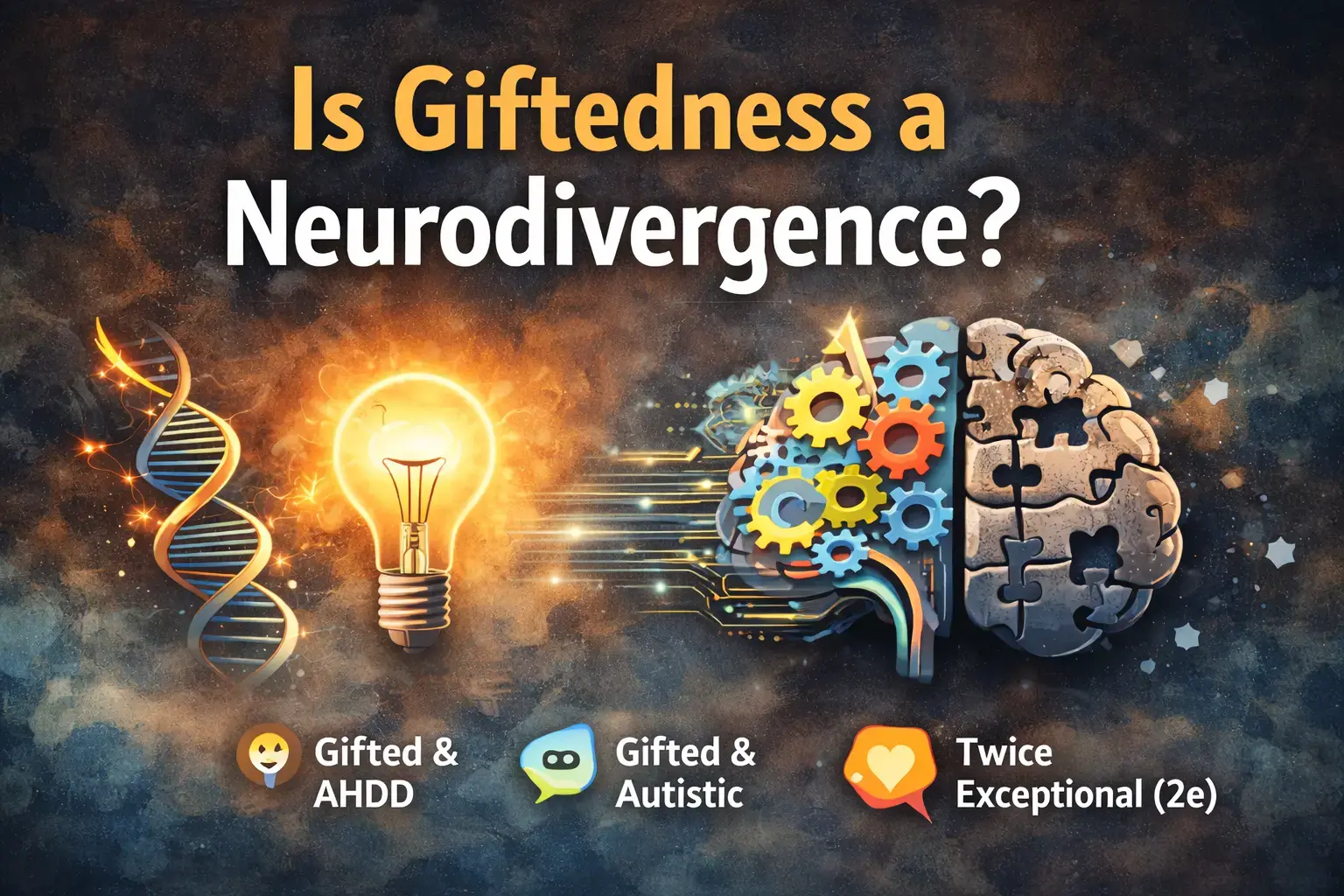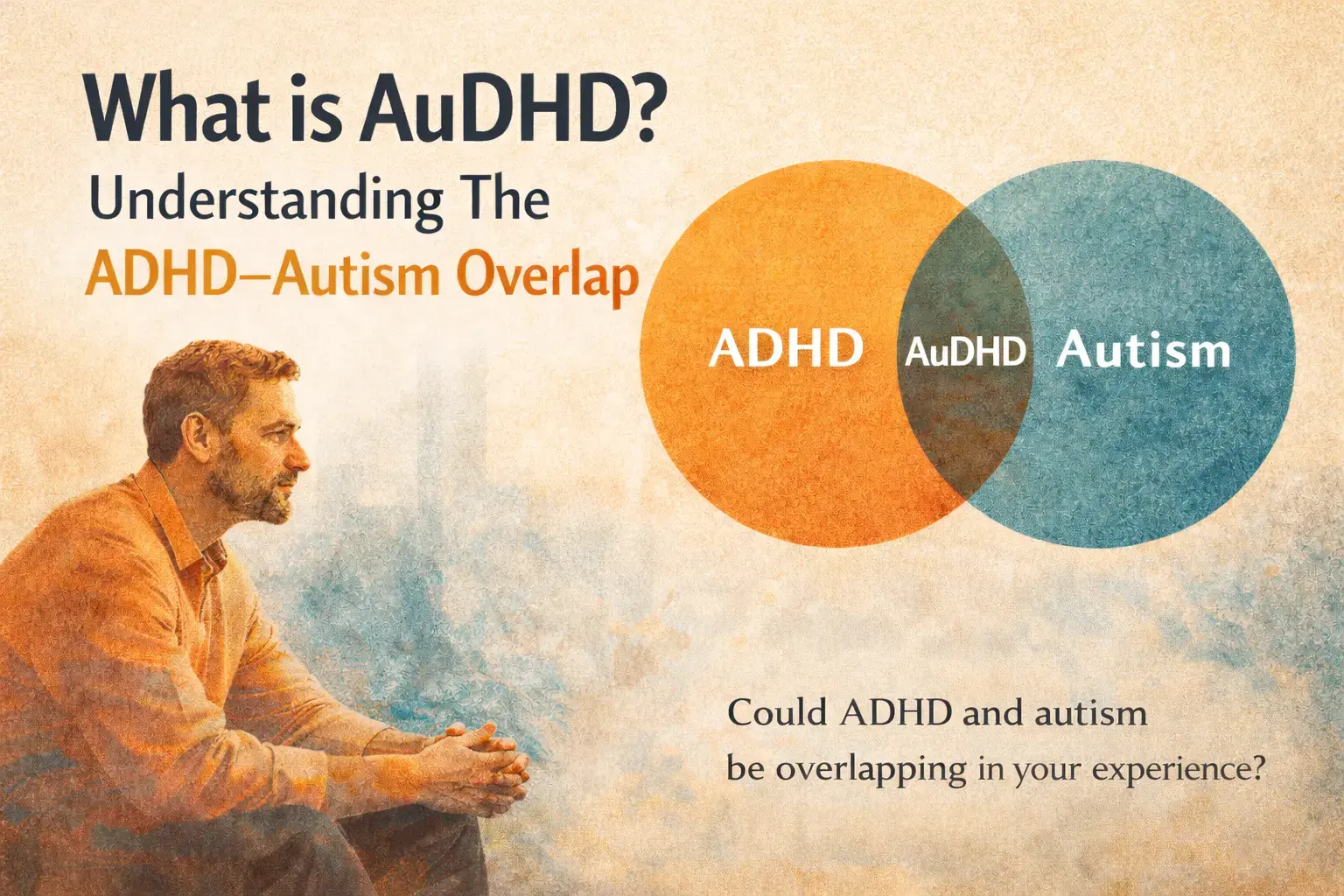Self-Compassion Practices for Neurodivergent Burnout
“Talk to yourself like you would to someone you love.” – Brené Brown
I still remember one afternoon when I found myself collapsed on the couch, staring at the ceiling, my mind foggy and my body heavy. I had been running on autopilot—saying yes to commitments, pushing through sensory overwhelm, holding myself to an impossible standard. My body had finally called a time-out.
In that silence, my first thought was, “You should be able to handle this.” That inner critic, sharp and relentless, didn’t let me rest easily. And yet, the more I’ve lived through cycles of neurodivergent burnout, the more I’ve come to see self-compassion as not a luxury, but a necessity.

Why Self-Compassion Matters in Neurodivergent Burnout
For many neurodivergent people—whether ADHD, autistic, AuDHD, gifted, or otherwise—burnout isn’t just “being tired.” It is a collapse of mental, emotional, and physical energy, often after prolonged masking, sensory strain, or unrealistic expectations.
Burnout often whispers shame: “Why can’t I keep up like others?” These thoughts aren’t the truth—they’re echoes of societal pressure.
If identity plays a role in burnout for you, you may appreciate the role of identity in neurodivergent healing.
Self-compassion interrupts that spiral. Instead of pushing ourselves deeper into depletion, it offers a way to pause, breathe, and honour the reality of our limits.
I’ve noticed that when I meet exhaustion with harshness, recovery stretches out much longer. But when I manage—even imperfectly—to say, “This is hard. I’m allowed to rest,” my nervous system begins to soften. The shame eases, and my body starts to trust me again.
Reflection Question: When you notice burnout creeping in, what voice do you hear first—criticism or kindness?
Understanding Neurodivergent Burnout
Neurodivergent burnout differs from conventional burnout in its causes, duration, and intensity:
- Masking fatigue: Holding in stims, forcing eye contact, pretending to “fit in.”
- Sensory overload: Bright lights, crowded spaces, and constant noise drain energy reserves.
- Executive dysfunction: When organizing or initiating tasks feels like climbing a mountain.
- Chronic invalidation: Being told you’re “too much” or “not enough.”
Unlike conventional burnout, which may resolve after rest or a holiday, neurodivergent burnout can persist for weeks or months. Recovery requires gentleness, recalibration, and rethinking how we relate to ourselves.
Reflection Question: What early signals does your body or mind give you that you’re approaching burnout?
Self-Compassion: A Radical Act of Resistance
Kristin Neff’s research highlights three elements of self-compassion:
- Self-kindness instead of self-criticism
- Common humanity instead of isolation
- Mindful awareness instead of over-identification
For neurodivergent individuals, practicing self-compassion is a radical and neurodiversity-affirming act. Society often tells us to “mask more” or “try harder.” But choosing kindness over criticism says: My worth isn’t measured by productivity. My humanity is enough.
At Becoming Yourself Counselling, we see this as a core principle of neurodiversity-affirming therapy—helping clients move from self-criticism to self-acceptance and care.
Reflection Question: Which “should” might soften if you approached yourself with compassion instead of judgment?
Mindful Self-Care for Neurodivergent Minds
Typical self-care advice—like spa days or long runs—often doesn’t meet ND needs. Mindful self-care for neurodivergent individuals looks different:
- Sensory-friendly tools: Weighted blankets, noise-cancelling headphones, soft lighting.
- Energy-based pacing: Planning tasks around natural energy rhythms.
- Micro-breaks: Short pauses to stim, stretch, or breathe.
- Safe foods and environments: Comfort over expectations.
At Becoming Yourself Counselling, mindful self-care is central to recovery. It’s about noticing what actually restores you, not what others think looks restorative.
Which sensory-friendly practices help you feel most grounded?
Everyday Self-Compassion Practices
Small, daily practices can help regulate your nervous system and prevent deeper burnout:
- Three-Breath Pause: Inhale, exhale, repeat three times. Whisper: “This is hard. I am allowed to rest.”
- Voice Notes of Kindness: Record gentle reminders for difficult moments.
- Gentle Movement: Rock, sway, stretch, walk—no pressure.
- “Good Enough” Mindset: Shift perfectionism to “It’s good enough.”
How can you make space for small, consistent acts of self-compassion each day?
Reframing Productivity and Rest
Many of us grew up equating worth with productivity. But rest is not laziness—rest is regulation.
Reframing productivity means:
- Honouring ND energy cycles.
- Normalizing downtime as part of sustainable living.
- Viewing rest as strength, not weakness.
When we rest, we reconnect with creativity and clarity. When we ignore those cues, we risk deeper burnout.
Reflection Question: What would change if you saw rest as a form of strength rather than failure?
You may find my reflection on rest and energy in Why Rest Is Productive helpful.
Creating a Self-Compassionate Environment
Healing burnout also involves shaping supportive external environments:
- Boundaries: Saying no to overcommitments.
- Supportive relationships: Surrounding yourself with people who affirm your neurodivergent needs.
- Soothing spaces: Soft textures, calm lighting, minimal clutter.
- Compassion cues: Sticky notes with reminders like “Rest is allowed.”
Becoming Yourself Counselling encourages clients to create environments that reflect their inner healing—spaces that feel safe, affirming, and compassionate.
Moving Toward Sustainable Healing
What is one compassionate act—small or simple—you could take today to honour your energy?
Burnout may recur in cycles, but self-compassion and neurodiversity-affirming therapy can help you navigate those cycles with more grace and awareness.
At Becoming Yourself Counselling, healing begins with honouring your energy, your limits, and your unique rhythm. Therapy isn’t about “fixing” yourself; it’s about learning to care for yourself in ways that sustain your wellbeing.
If you’d like to learn more about how I support neurodivergent adults experiencing burnout, you can visit my About Michael page, where I outline my lived experience and neuroaffirming approach to chronic overwhelm.
If this post resonates with where you are right now, you’re welcome to reach out via my contact page to explore support tailored to burnout recovery.
Or stay on the blog and learn more about ADHD, Autism, and Giftedness.
FAQ: Self-Compassion and Neurodiversity-Affirming Therapy for Burnout
Q1: What is neurodivergent burnout?
Neurodivergent burnout is a state of extreme exhaustion experienced by autistic, ADHD, and other neurodivergent individuals. It’s caused by masking, sensory overload, chronic stress, and unmet needs—leaving people physically, mentally, and emotionally drained.
Q2: How does self-compassion help with neurodivergent burnout?
Self-compassion helps counter harsh self-criticism that worsens burnout. By practicing kindness, you reduce shame, regulate stress, and support sustainable recovery.
Q3: What are examples of mindful self-care for ND individuals?
Mindful self-care may include sensory retreats, weighted blankets, pacing tasks, grounding exercises, and affirmations—all tailored to neurodivergent needs.
Q4: Can mindfulness reduce neurodivergent burnout?
Yes. Mindfulness helps identify early signs of burnout, reduces overstimulation, and supports nervous system regulation. In neurodiversity-affirming therapy, we adapt mindfulness to ND-friendly formats.
Q5: Is rest a valid form of self-compassion for ND burnout?
Absolutely. Rest isn’t avoidance or laziness—it’s a vital part of self-regulation and long-term wellbeing.
See also: ND Affirming Therapy and Masking, Burnout, & High Achievers.
Blog Disclaimer
This blog includes occasional personal anecdotes used to illustrate therapeutic ideas and foster connection. All identifying details have been altered or omitted to protect confidentiality. These reflections are intended as examples only; every individual’s experience is unique, and what resonates for one person may not apply to another.
The information provided here is for educational and informational purposes and should not be considered a substitute for professional medical or mental health advice, diagnosis, or treatment. If you have concerns about your health or well-being, please consult a qualified healthcare provider or licensed mental health professional.
Psychotherapy services described on this site are available to residents of Ontario. If you are interested in support or would like to schedule a complimentary 20-minute consultation, you are welcome to contact me through my practice.
These resources are offered to support your learning and self-understanding as you move toward a more grounded, authentic, and meaningful life.

Michael Holker HBA, BSW, MSW
Michael Holker, MSW, RSW, is the compassionate heart behind Becoming Yourself Counselling. Discovering his own neurodivergence later in life shaped his existential, humanistic, and strengths-based approach to therapy. Guided by his lived experience, Michael helps neurodivergent individuals move beyond self-criticism toward self-understanding, self-compassion, and self-acceptance. His work invites clients to honour their journeys, embrace their resilience, and reconnect with their authentic selves, cultivating a life of greater alignment and meaning.


